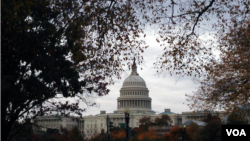One day after narrowly meeting a deadline to keep the U.S. government open through December 11, Congress is returning to a partisan battle over longer-term funding in which military spending prioritized by Republicans is competing with domestic spending prioritized by Democrats.
The stopgap measure that averted a partial government shutdown extends 2015 funding levels into the first 10 weeks of the 2016 fiscal year, which began Thursday. Lawmakers from both parties say it constitutes a grand failure by Congress to exercise its authority over America’s purse strings.
“Putting government on autopilot is not the responsible way to fund government,” said Republican Senator Susan Collins. “It locks in last year’s priorities, delays the start of vital new programs and allows unneeded programs to continue to be funded.”
Multiple funding bills for the new fiscal year are on hold as Republicans and Democrats, including President Barack Obama, haggle over spending levels pared back in recent years by automatic, across-the-board cuts.
The Pentagon is among the entities caught in the partisan crossfire.
Republican pressure
Republicans pressed for final passage of the National Defense Authorization Act, which lays out how much the Defense Department can spend and to what ends.
“Let’s take a look at what’s going on in the world today,” said Republican Representative Bradley Byrne of Alabama, a member of the House Armed Services Committee, citing conflicts from Ukraine to Syria and beyond. “In the middle of all of this, we should be having a bipartisan, unified front to tell the world, to tell our adversaries and allies that we are united.”
Democrats accused Republicans of using a budgetary gimmick to circumvent spending caps for the military.
“It [the proposed NDAA] takes the emergency account, the Overseas Contingency Operations fund, and turns it into a slush fund to temporarily fund all kinds of other programs,” said Democratic Representative Jared Polis of Colorado.
Beyond the specifics of the NDAA, Democrats argued a larger point: If the Pentagon gets short-term relief from spending limits, then a number of non-military domestic programs should also see a boost in funding.
Senate Minority Leader Harry Reid, a Nevada Democrat, was unapologetic in pressing that point.
“We [Democrats] are concerned about non-defense stuff,” Reid said. “We’re concerned about the FBI, the federal court system. We’re concerned about our forests that are burning down. We’re concerned about money to build our highways. And rightfully so.”
Byrne agreed that Congress must address domestic needs — just not now.
“That is a debate worth having, but this is not the time for that debate,” Byrne said. “There is nothing more important for us to do today than to make sure that we are standing tall and standing unified for the defense of our country.”
Late Thursday, the House approved the NDAA 270-156, ignoring a veto threat from the White House. Obama has objected to provisions siphoning the emergency contingency funds into other areas of defense spending.
Balance issue
The balance between military and domestic spending is sure to come up in budget talks tentatively scheduled between the White House and congressional leaders. The stopgap spending measure approved Wednesday was designed to give Washington time to reach a bipartisan fiscal agreement for the coming year and beyond.
Until those talks begin, Republicans and Democrats are staking out positions and drawing battle lines in both houses of Congress.











